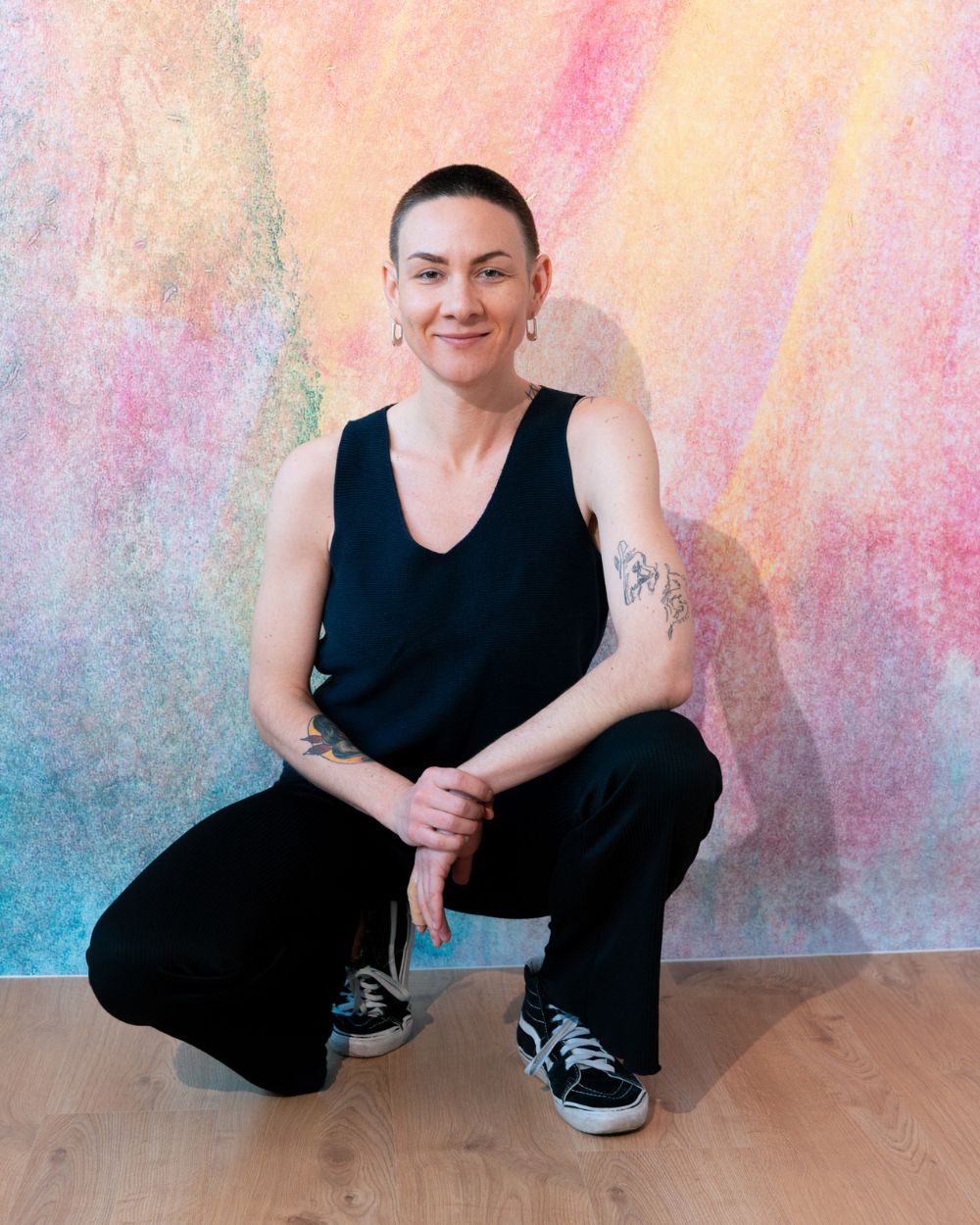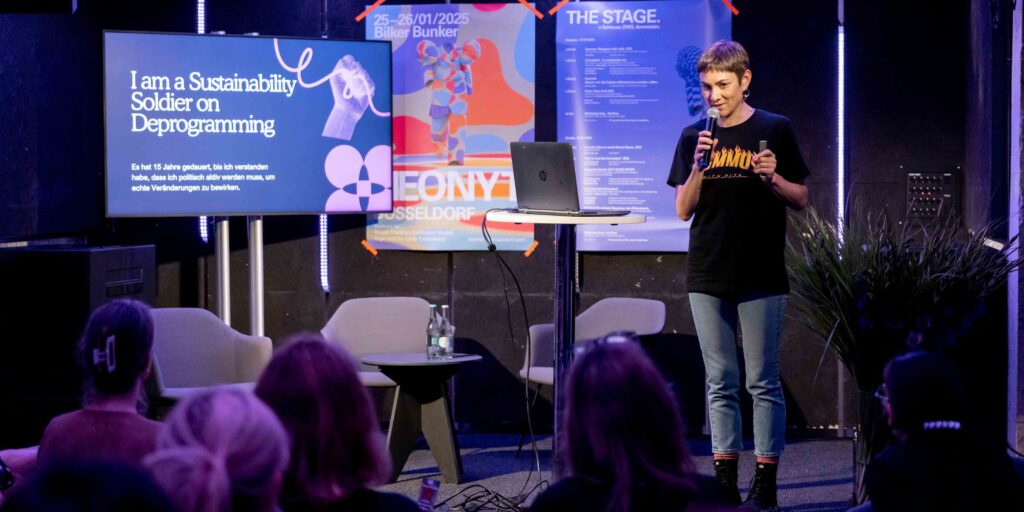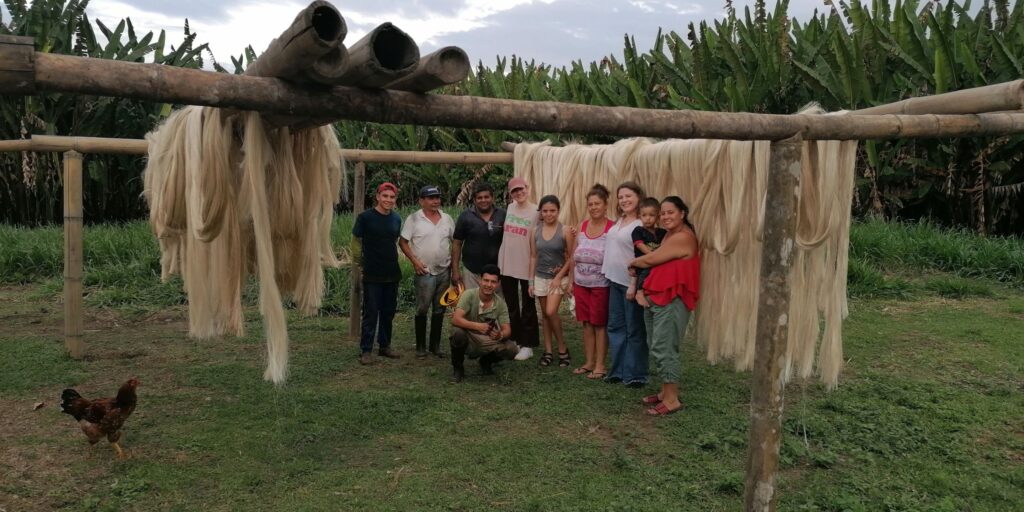PLEB sat down with (Un)Sustainability Consultant & Provocateur Lavinia Muth to discuss business ethics within greenification, education & sustainability rhetoric.

Lavinia has 15 years of experience in the field of sustainability in fashion & global agriculture, having transitioned from roles rooted in compliance and auditing. She has grappled with her own challenges, recognising the limitations of the traditional sustainability narrative. Lavinia also witnessed the pitfalls of engaging in what she refers to as “stewardship superiority” during her years of advising textile factories and fashion brands and retailers around the world.
Through her personal journey, Lavinia has come to understand the importance of social justice and environmental justice, embarking on a journey of questioning power structures and understanding post-growth within the context of sustainability. She now works as a freelancer, dedicated to diverse projects focused on social justice issues in the textile sector while still contributing to decarbonisation, circularity, and materiality efforts for carefully selected clients. She intends to distance herself from the corporate sustainability world and looks for community, alternative solutions and existing knowledge, because the solutions might already be there.


Un-Sustainability Perspective: You describe yourself as an ‘(Un)Sustainability Consultant & Provocateur.’ Could you explain what Unsustainability means to you, and how you use provocation to challenge mainstream sustainability narratives?
As an “(Un)Sustainability Consultant & Provocateur,” my use of the term “unsustainability” arises from a profound recognition of how mainstream sustainability efforts are deeply aligned with the same power structures that perpetuate harm, particularly the military-industrial complex, corporate-driven capitalism, and colonial legacies. These institutions thrive on extraction, exploitation, and inequality, which sustain the very systems they claim to reform. I use provocation in my work as a “sustainability soldier on deprogramming” to expose the inherent contradictions in these initiatives.
The sustainability industry itself, often portrayed as virtuous, operates within a framework that maintains global inequalities, colonial exploitation, and corporate profiteering. For example, much of today’s fashion supply chain depends on exploitative labour practices in the Global South. I critique this alignment by highlighting the industry’s colonial roots. This makes my focus on “unsustainability” essential, because these efforts do not seek to dismantle the system but rather sustain it. I’ve adopted this language because no other word properly encapsulates my evolving understanding of coloniality. I don’t claim to decolonize everything in my work, but I do make it a point to challenge this deeply entrenched system.
Business Ethics in Fashion: As a lecturer in business ethics within fashion and the creative industries, how do you perceive the industry’s current relationship with sustainability? Where are the major gaps?
As a lecturer in business ethics, I see a clear disconnect between the industry’s narrative of sustainability and the reality of its practices. The big knowledge-doing gap stems from academic environments that are themselves whitewashed and disconnected from multiple global realities. In academia, the curriculum is often built to serve existing systems of power rather than to challenge them. Universities frequently focus on preparing students for a broken labour market rather than encouraging collective thinking or activism.
This focus on “employability” reflects how universities are co-opted into maintaining the status quo. Instead of nurturing radical thinkers, they churn out individuals ready to operate within these systems. The major gaps lie in the failure to teach critical thinking about systemic inequalities and the impact of neoliberal capitalism on sustainability in my humble experience.

The Fashion Industry’s Role: In your experience, how has the fashion industry contributed to the sustainability crisis, and what should be its role in reversing the damage done?
Fashion is a major driver of this notion of sustainability due to its fast-consumption model, resource extraction, overproduction reliance on fossil fuels and cheap labour, mostly from the Global South. The industry’s role has been one of deep exploitation of both people and the environment. Fashion’s role should not just be about mitigating damage but about actively reversing its impacts. This involves radically reducing consumption in the North, confronting its colonial legacy, and supporting reparative practices that go beyond greenwashed tokenism.
Colonial Narratives in Sustainability: Given the article you referenced about colonial sustainability, do you think many sustainability initiatives inadvertently perpetuate colonialist mindsets? How can businesses, especially in fashion, avoid this?
All sustainability initiatives today coming from the West, especially in fashion, are fundamentally entangled in coloniality in my opinion. Happy to be challenged on that They are born out of a system that has historically used organized violence and extraction to gain dominance, as highlighted by Samuel P. Huntington’s quote that I often reference: “The West won the world not by the superiority of its ideas or values or religion… but rather by its superiority in applying organised violence.”
This truth holds for fashion as well: “London, Paris, Milan, Copenhagen, and New York won the world not by the superiority of their designs but by their superiority in applying organised extraction and appropriation.” To decolonise, we need to acknowledge these violent histories and actively dismantle these power structures.
Fashion’s Relationship with Ethics: How can fashion brands balance profit-driven goals with genuine ethical sustainability practices without falling into the trap of greenwashing? This is a tough one as many businesses think just by using recycled packaging they are sustainable, for example.
The truth is that fashion brands attempting to balance profit-driven goals with ethical sustainability almost always fall into the trap of greenwashing. The system is too broken to allow for genuine ethical practices without perpetuating this notion of sustainability. Recent Nobel Prize awards, for instance, highlight the limits of these supposedly transformative systems. The laureates, who have demonstrated the importance of societal institutions for prosperity, seem to reinforce the idea that progress is possible within existing frameworks. However, the economic growth model remains deeply flawed. What we need is not just a focus on economic prosperity but a radical critique of growth, capitalism, and their exploitative mechanisms. Post-growth economics and other world views should be at the forefront of discussions about sustainability.
Decolonizing Business Practices: In your view, what are the key steps fashion and creative industries can take to truly decolonize their sustainability efforts?
I must admit I don’t know. I’m not there yet in terms of outlining steps for decolonizing business practices, maybe I will never be. There are institutions that claim to be working towards this, but I remain skeptical. From what I have learnt, decolonization would involve reparative measures, redistributing wealth, and dismantling harmful systems. At the core, businesses need to understand coloniality before they can even begin to decolonize. It starts with the self and the institutions, but no single solution can address the scale of this problem. I’m wary of the buzz around “transitions” and “transformations” – it often seems like empty rhetoric. Despite all this talk about change, I’m not seeing true shifts happening. Maybe we need to transform our understanding of “change” as well.
Challenges in Education: What are the biggest challenges you face when educating the next generation of business leaders about sustainability and ethics, especially in industries that thrive on trends and fast consumption?
One of the biggest challenges I face in educating future business leaders is the outdated curricula. Universities often operate in a silo, disconnected from real-world issues and realities. Sponsored by the private sector, these programs frequently teach students how to fit into the system, rather than how to question it. The focus on conscious consumption and trends makes it difficult to foster a critical, long-term view on sustainability and ethics.
Consulting Provocations: How do you use your position as a provocateur in your consulting work to spark change in unsustainable business practices? Can you share any examples of pushback you’ve received?
As a provocateur, I use my consulting work to shake up sustainable business practices by asking uncomfortable questions and pointing out contradictions. Pushback comes when companies feel attacked or exposed for their greenwashing efforts. For example, I’ve criticized brands that tout their use of shaming production outside of Europe while continuing to uphold exploitative practices and hegemonic, euro-centric narratives. This kind of provocation forces them to reflect on the gaps between their public-facing rhetoric and actual impact. But, I try to challenge and engage in conversations. I do not shut doors.
Alternative Models: Given your discomfort with the capitalist model, how do you envision alternative systems that could drive sustainability without compromising ethics or perpetuating economic disparities?
I am not uncomfortable; I am deeply disgusted with the capitalist model because it manipulates sustainability to perpetuate a broken system, among others. To be honest with myself, I do live pretty well and am highly comfortable in the capitalist system because of my heritage, the place where I was born, etc. I guess most of us readers do.
Again, capitalism, intertwined with the military-industrial complex, sustains its power through violence, extraction, and exploitation. If we are to envision alternative systems, we need to think about models that move beyond profit and growth like communal ownership, and degrowth practices could be ways forward. But this requires a complete overhaul of our current structures.
Collaboration and Action: What are practical steps that creatives, businesses, and media platforms can take to not just talk about sustainability but actively address and challenge its unsustainable roots
Creatives, businesses, and media platforms need to stop just talking about sustainability and start engaging in concrete actions. This means embracing the complexities and stopping to reduce the problems to simple narratives and one-single set of solutiuons, especially tech-solutions, supporting labor movements, and challenging corporate power. Real collaboration involves dismantling existing structures and creating alternative spaces where marginalized voices are protected and clearly lead the conversation.
Personal Insights: What inspired your journey into the intersection of business ethics and sustainability, and what keeps you motivated in the face of industries that seem slow to change?
My journey into the intersection of business ethics and the notion of predominant sustainability was sparked by a deep frustration with how the sustainability industry often upholds the systems it claims to dismantle. And also, my realization that I am perpertuating this through my own manifested white-saviorism. What keeps me motivated are the people I work with, and the need for ongoing deprogramming – both for myself and for others. The industry may be slow to change, but there’s so much power in critical inquiry and resistance.
Sustainability and Wealth: Is sustainability only for the rich?
Sustainability, as it is currently framed, is a luxury reserved for the wealthy. While the narrative is that sustainable practices and products are for the benefit of all, the reality reveals a stark contradiction: expensive products, certifications, and lifestyle changes often only cater to affluent consumers. This exclusion is not a coincidence, it is a reflection of the consumerist mindset ingrained in Western capitalism. The result is a two-tier system where only the privileged can afford to partake in sustainable living, while those without economic power are left to bear the consequences of environmental degradation and exploitative labour conditions. It is a form of “green capitalism,” where the rich consume “consciously”. And, this is an oxymoron in itself.
Do you think that by stopping the consumption of new things, we stand a chance at extending the life of the planet or at least stemming the flow of pollutants and waste? And if so, what would be your suggestions for finding income for people whose livelihoods are taken away by such a change?
I would like to highlight the reductionist layer within this approach. Suggesting that simply stopping consumption will solve our planetary crisis ignores the complexities of global inequality and the realities of people’s livelihoods, especially outside the West. It reflects a “one-solution-fits-all” mindset that overlooks the systemic issues fueling consumption and environmental harm.
The problem you are raising, I believe, is that these Western calls to halt consumption often fail to address the core structures that drive exploitation and don’t offer realistic alternatives for people whose work sustains their communities. Instead of blanket mandates to “stop,” the focus should shift toward letting the affected folks building economies that respect wider ecosystems, centre community resilience, and create meaningful livelihoods. This means among other shifts, investing in local industries, diverse knowledge systems and regenerative practices that aren’t extractive but restorative.
To create income opportunities for those impacted by shifts away from unsustainable industries, we need to prioritise reparative measures like debt cancellation for countries long exploited for their resources and labour. This would enable communities to invest in their own sustainable, resilient futures without the constraints of debt imposed by external powers. With this relief, one can focus on fostering livelihoods centred around diverse knowledge, ecological care, and community-driven economies.
Without these actions, simply telling communities to stop unsustainable practices continues the same imbalances that the sustainability movement should be working to undo.
Anything else you would like to add?
So honoured and amazed to have been asked these questions by you. I believe that the future of a more caring world or a no-harm and/or less-harmful world depends on critical thinking and feeling and recognising the colonial underpinnings of today’s industries. It’s time we stop talking about “change” and start deprogramming from the systems that perpetuate sustainability – how it is practised today.
Website: laviniamuth.com
Instagram: @lalla.vinia
LinkedIn: Lavinia Muth
Contact: lavinia.muth@posteo.de
Location: Germany